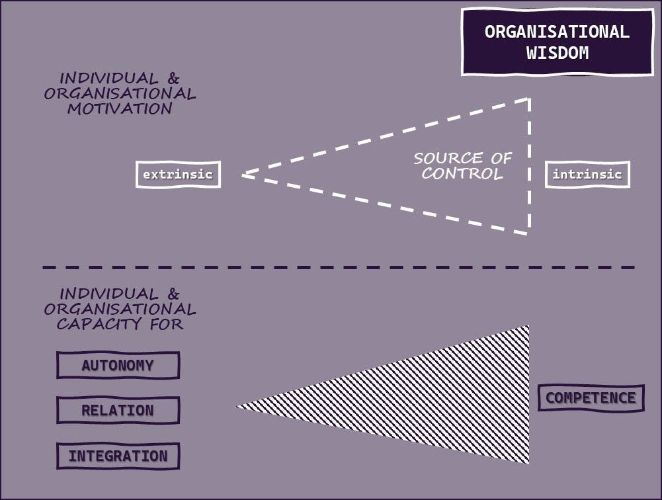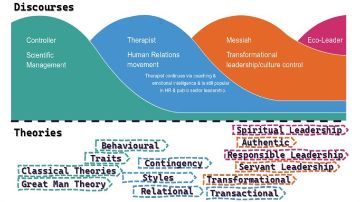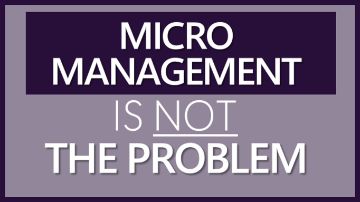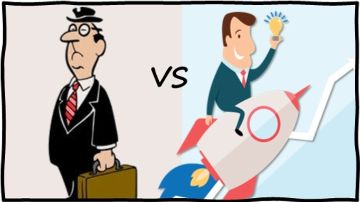
It might be a symptom of our shallow discussions about organisational transformation that often posts single-mindedly demonise the perils of micro-management. Many such popular and populist posts come decorated with funny visuals, ready-made lists of "suggestions" and good practices...

It might be a symptom of our shallow discussions about organisational transformation that often posts single-mindedly demonise the perils of micro-management. Many such popular and populist posts come decorated with funny visuals, ready-made lists of "suggestions" and good practices, or allegedly thought-provoking questions like: "how often did you disagree with your team's decisions last week?" Sadly, most of this is missing the point…
In order to improve managerial practice, we cannot focus only on the limited dichotomy of leaders vs followers, or supervisors vs subordinates - and single-mindedly purport "organisational liberation" as a question of (more) freedom for employees. Everybody with real-life management experience will realise such stories are compelling, but highly superficial. Undoubtedly, there are still "nasty bosses" (sic!) who purposefully exploit and harass their teams - but, gladly, in my experience that is not the widest-spread phenomenon; and, more importantly, those bosses are very often a "product" of an organisational system, rather than its cause.
Hence, any intervention that only focuses on the behaviours of managers - even if promoted with good intentions and the somewhat missionary zeal of socialist harmony and "unbossing", or a libertarian cry for freedom and individualist autonomy - is doomed to fail.
In practice, "micro management" often points to a deeper question of organisational maturity.
- On the one hand, it invites for deeper exploration of individual and organisational motivation: is the focus extrinsic (control through peers and culture; incentives; or authority) or intrinsic (driven by the task itself or a desire to contribute through organisational purpose)?
- On the other hand, there is a question about individual and organisational capacity for accountability and responsibility: are individuals "competent" in regards to their ability to complete their tasks with expertise and autonomy, whilst appropriately and heedfully relating to others, and to support meaningful organisational integration?
A core lesson for all executives who have succeeded in installing agile management systems is that decentralisation of decision-making requires both teams and managers to be competent, willing, and able to "think and act on behalf of the organisation as a whole" - especially in highly interdependent and complex businesses. In fact, for a responsible leader, there is often no option to just "hand over" control to potentially unwilling, incompetent, or non-enabled (in terms of organisational context, information flows, support systems etc) individuals. Yet, certainly, that cannot become an excuse.
Rather than simply "stop micro management", we need good leaders to systematically START developing organisational maturity - incrementally progressing both decentralisation of decisions and individual and organisational capacity, in close lock-step… which in most cases requires more holistic and transformational changes than processing someone's alleged "seven secrets of democratic management".
#leadership #transformation #agile #goodorganisations #wisdom #purpose #personaldevelopment
It might be a symptom of our shallow discussions about organisational transformation that often posts single-mindedly demonise the perils of micro-management. Many such popular and populist posts come decorated with funny visuals, ready-made lists of "suggestions" and good practices, or allegedly thought-provoking questions like: "how often did you disagree with your team's decisions last week?" Sadly, most of this is missing the point…
In order to improve managerial practice, we cannot focus only on the limited dichotomy of leaders vs followers, or supervisors vs subordinates - and single-mindedly purport "organisational liberation" as a question of (more) freedom for employees. Everybody with real-life management experience will realise such stories are compelling, but highly superficial. Undoubtedly, there are still "nasty bosses" (sic!) who purposefully exploit and harass their teams - but, gladly, in my experience that is not the widest-spread phenomenon; and, more importantly, those bosses are very often a "product" of an organisational system, rather than its cause.
Hence, any intervention that only focuses on the behaviours of managers - even if promoted with good intentions and the somewhat missionary zeal of socialist harmony and "unbossing", or a libertarian cry for freedom and individualist autonomy - is doomed to fail.
In practice, "micro management" often points to a deeper question of organisational maturity.
- On the one hand, it invites for deeper exploration of individual and organisational motivation: is the focus extrinsic (control through peers and culture; incentives; or authority) or intrinsic (driven by the task itself or a desire to contribute through organisational purpose)?
- On the other hand, there is a question about individual and organisational capacity for accountability and responsibility: are individuals "competent" in regards to their ability to complete their tasks with expertise and autonomy, whilst appropriately and heedfully relating to others, and to support meaningful organisational integration?
A core lesson for all executives who have succeeded in installing agile management systems is that decentralisation of decision-making requires both teams and managers to be competent, willing, and able to "think and act on behalf of the organisation as a whole" - especially in highly interdependent and complex businesses. In fact, for a responsible leader, there is often no option to just "hand over" control to potentially unwilling, incompetent, or non-enabled (in terms of organisational context, information flows, support systems etc) individuals. Yet, certainly, that cannot become an excuse.
Rather than simply "stop micro management", we need good leaders to systematically START developing organisational maturity - incrementally progressing both decentralisation of decisions and individual and organisational capacity, in close lock-step… which in most cases requires more holistic and transformational changes than processing someone's alleged "seven secrets of democratic management".
#leadership #transformation #agile #goodorganisations #wisdom #purpose #personaldevelopment
Popular articles in the KnowledgeHub: Good Leadership





 .
.